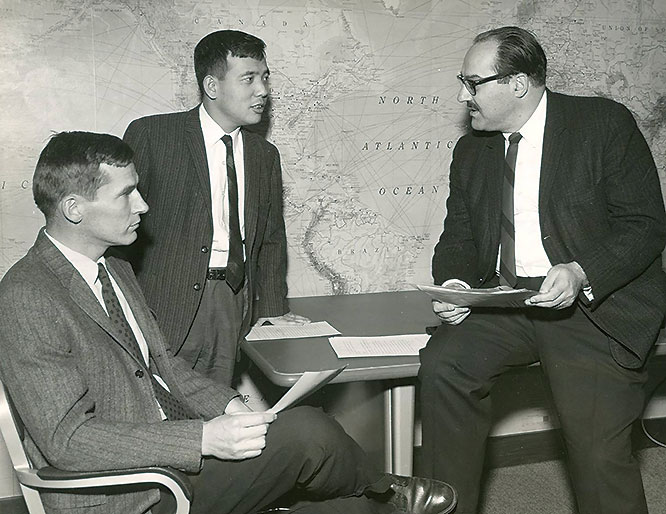Disclaimer: machine translated by DeepL which may contain errors.
Climate Research with Dr. Manabe
JUNO MASUMOTO, Professor, Department of Earth and Planetary Science
Like a child full of curiosity. With all due respect to Professor Manabe, who is a very senior professor, this is the impression I had when I met him for the first time after knowing him only through his papers for a long time, and I am sure many of you will agree with me. However, in researching how the Earth's climate is determined and how it is changing, it is impossible to go on without reading Dr. Manabe's papers, and he is a giant in the field of climate research. The news that Dr. Manabe has been awarded the Nobel Prize in Physics has been circulating around the world. I would like to extend my heartfelt congratulations to Dr. Manabe on receiving this award.
Dr. Manabe has developed a physical model of radiative-convective equilibrium, which is important in considering the Earth's climate, and has used a computer-based numerical model to clarify how the input of solar radiation energy to the Earth's atmosphere, where various radiation absorbing gases exist, causes temperature distributions and how the radiation absorbing gases affect these distributions. The numerical modeling is based on computer simulations. We have developed from a vertical one-dimensional atmospheric model to a three-dimensional climate model that couples the atmosphere and oceans, quantifying climate variability and change and establishing a foundation for reliable global warming prediction. Through his research, he has made significant contributions to our understanding of the physics of climate, which is considered to be a representative example of a complex system.
Looking at Dr. Manabe's research to date, we can see that he has maintained a style of thinking and modeling complex phenomena as simply as possible while preserving the essence of the phenomena. This is exactly what physics aims for. I cannot help but be surprised that he has maintained a keen eye for the essence of the phenomena and is still actively researching them. I do not know if it was by chance or necessity, but perhaps it was fortunate for us that our interests were focused on the Earth's atmosphere and oceans, which can be considered ultra-complex systems, and the climate woven by them. The period from the late 1950s to the 1960s, when Dr. Manabe began his research, was a time of great progress in the construction of numerical models of the atmosphere and oceans and in numerical methods, and it can be said that his curiosity and physical sense intersected at the right time with the great swell of the times. He has conducted pioneering research in the field of predictive science, focusing on the future of global warming as one of the mechanisms of climate change, but he has also turned his interest to the past and has made many achievements in paleoclimate research on the Earth. I will never forget the shock I felt when I read his paper showing that even under the same boundary conditions, the meridional circulation reaching from the surface to the depths of the global ocean can be realistic or extremely weakened depending on the initial conditions, and that this has a significant impact on the global climate as a whole.
 |
 |
| Dr. Manabe as a young man. Left: Dr. Manabe with Director Smagorinsky (right) and Dr. Bryan (left) at the Geophysical Fluid Dynamics Laboratory, Atmosphere and Ocean Research Institute (1969). The year and location of the photo on the right are unknown. Photo courtesy of the Geophysical Fluid Dynamics Institute. | |
The issue of global warming is often treated as an environmental problem from the perspective of an outlet because of its immeasurable impact on various socioeconomic activities, including our daily lives, but this award is seen as an important message that physics is fundamental to understanding and predicting the problem. Although Dr. Manabe's research has deepened our understanding of the complexity of the Earth's climate, the climate remains complex and seems to be taking everything we do in stride. As the conditions surrounding the Earth's climate change, further understanding of how various atmospheric and oceanic phenomena are affected and how they relate to each other to change the climate, based on Professor Manabe's research, is required.
Published in the November 2021 issue of Faculty of Science News


